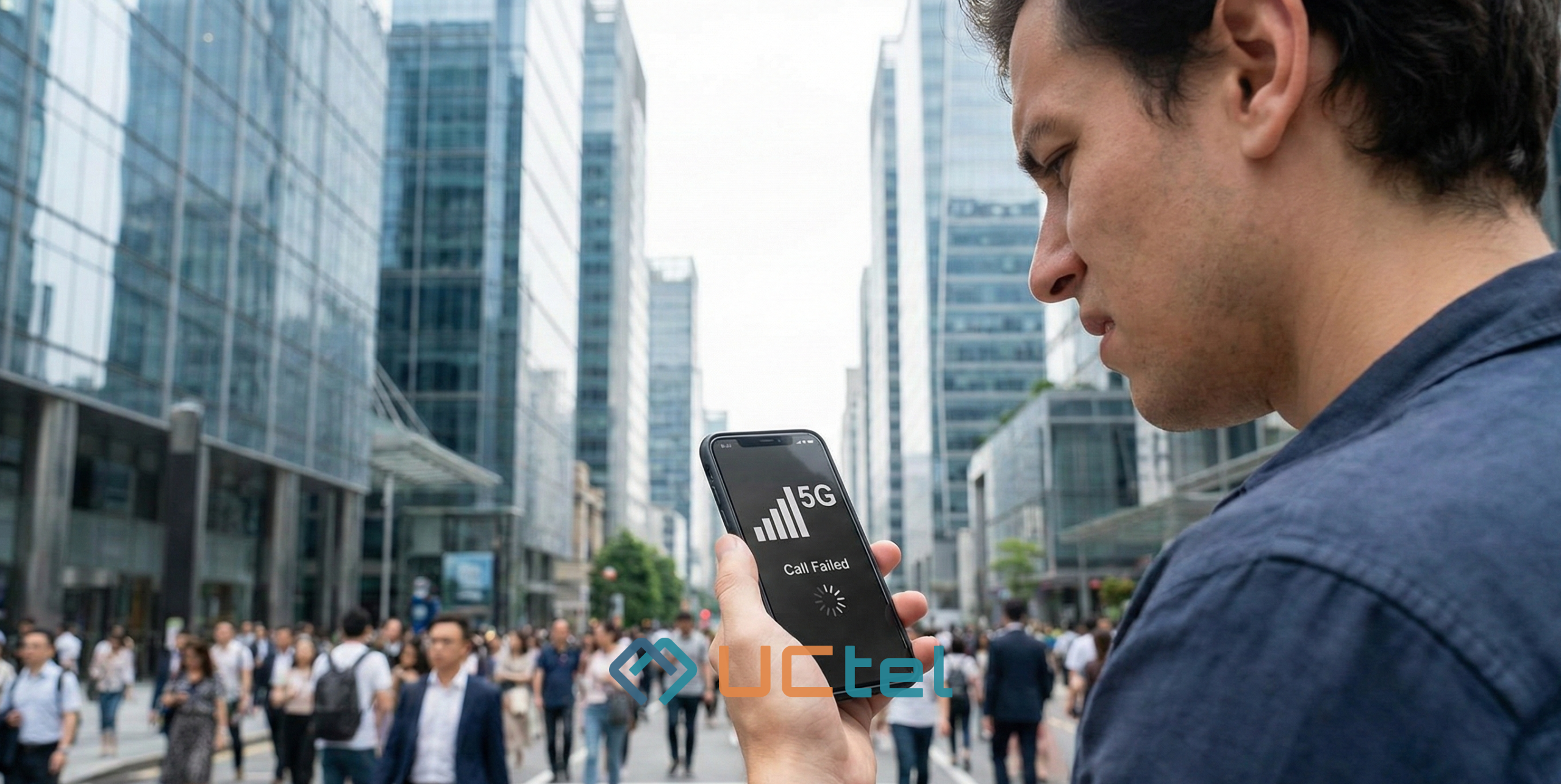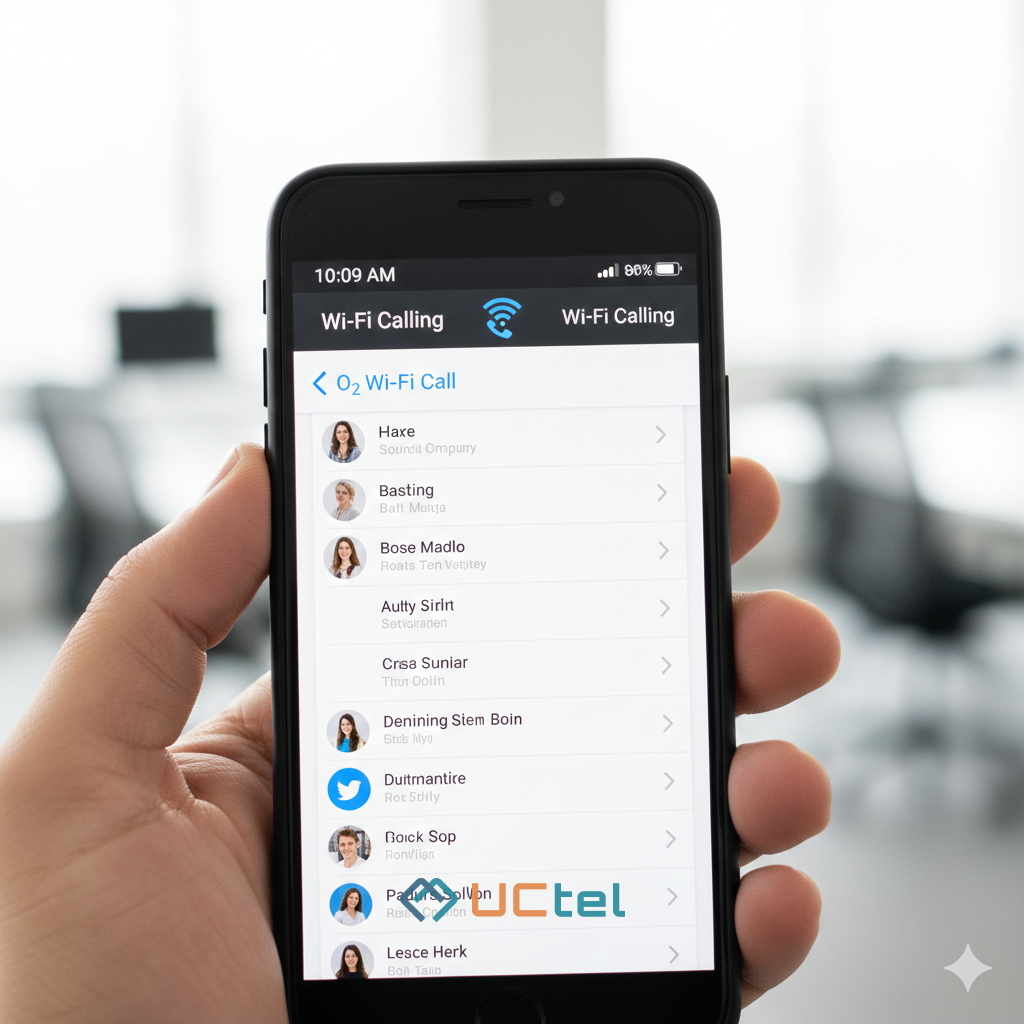When Will 4G Be Phased Out in the UK?

Table of contents
- 1. The Current State of 4G in the UK
- 2. Will 4G Be Phased Out?: Reasons for the Shutdown
- 3. What the 4G Phase-Out Means for Businesses
- 4. Expected Timeline for 4G Phase-Out in the UK
- 5. What Will Replace 4G?
- 6. How to Prepare for a 4G Shutdown in the Future
- 7. UCtel as a 4G-to-5G Transition Solution
- 8. Conclusion
With the impending 3G shutdown and 5G already transforming connectivity, you might be wondering, "How long will 4G be around, and what does it mean for me?" The truth is that modern tech evolves rapidly, and mobile networks are constantly upgrading to keep pace with demand. While tech retirement won’t happen overnight, individuals and businesses more and more often come up with questions like “When is 4G being turned off in the UK?”
To ensure a seamless transition, companies relying on 4G should assess their network infrastructure, explore 5G-ready solutions, and consult with experts like UCtel, a trusted connectivity solutions provider helping businesses adapt to the ever-changing telecom landscape since 2011.
But first, let’s have a look at where 4G is in the UK now and what’s waiting ahead.
The Current State of 4G in the UK
In such a fast-paced age as ours, any predictions about when will 4G be shut down in the UK are mere suppositions with a very loose reference to an exact date. Therefore, before making any suggestion as to when will 4G be switched off, it’s worth first considering how 4G is doing at the moment, as it continues to play a crucial role in ensuring connectivity, especially in areas where 5G infrastructure is still developing.
4G network coverage
The UK boasts extensive 4G coverage, with all major mobile network operators (EE, Vodafone, O2, and Three) providing nationwide services. According to Ofcom, 4G outdoor coverage from at least one operator is available to over 98% of the UK population. In the meantime, initiatives such as the Shared Rural Network (SRN) have been introduced, aiming to further enhance 4G coverage in hard-to-reach locations.
4G usage trends in the UK
4G remains the most widely used mobile network, with millions of users relying on it daily for calls, messaging, and high-speed internet access, particularly in areas where 5G rollout is still limited.
- Remote work and hybrid offices hinge on reliable 4G internet access for video conferencing and cloud-based applications.
- Streaming services like Netflix, YouTube, and Spotify heavily rely on 4G connectivity to offer seamless viewing and listening experiences on the go.
- IoT and smart devices still use 4G networks to operate efficiently.
- For many areas lacking fibre broadband, 4G serves as a critical alternative for high-speed internet access.
Will 4G Be Phased Out?: Reasons for the Shutdown
While 4G has been the backbone of mobile communications in the UK for over a decade, it won’t last forever. To predict when is 4G being turned off, let’s look into what could drive the shutdown.
Shift to 5G
Just like 4G once came to gradually push out 3G, the ongoing rollout of 5G technology is the main reason for the 4G switch-off in the UK. With faster speeds, lower latency, and the ability to connect a massive number of devices at once, 5G is set to revolutionise everything from mobile browsing to smart cities and autonomous vehicles. Besides, future technologies, such as 6G, are at the back of the pack, forcing mobile networks to free up bandwidth and optimise their resources to keep up with demand.
Network maintenance and cost considerations
Running multiple generations of mobile networks simultaneously is expensive and inefficient. As 5G adoption grows, maintaining older networks like 4G will become less financially viable. Phasing out older networks allows providers to cut maintenance costs, streamline operations, and redirect investment towards next-generation connectivity.
Spectrum efficiency and performance upgrades
Mobile networks operate within a limited radio frequency spectrum. Network operators should continuously reallocate spectrum bands to newer technologies to support better connectivity, reduce congestion, meet growing data consumption, and ensure optimal performance. Hence, 3G is being shut down to make way for enhanced 4G and 5G capabilities. A similar shift will eventually happen for 4G, allowing for even more advanced, high-speed mobile services.
What the 4G Phase-Out Means for Businesses
When will 4G be phased out in the UK? This question bothers many modern businesses, big and small, since they should catch up with network evolvements to ensure seamless operation. While a shift away from 4G is not expected tomorrow, businesses should plan ahead for possible challenges.
- Operational disruptions due to connectivity risks for businesses using 4G for critical operations, such as logistics, transportation, healthcare, office buildings, and public sectors heavily relying on mobile-based systems.
- Many legacy IoT devices still operate on 4G networks, meaning the phase-out could render them obsolete. This might impact automated machines and industrial sensors, smart cities, utilities, mobile point-of-sale (POS) systems, fleet tracking, etc.
- Communication delays and mobile data reliability issues for businesses dependent on 4G-powered voice, video, and messaging services.
- Cybersecurity implications, pushing companies to reassess their cybersecurity strategies to address new vulnerabilities introduced by the migration.
- Significant financial investments related to transitioning between networks, including the purchase of new devices, software upgrades, and increased data costs.
Expected Timeline for 4G Phase-Out in the UK
Is 4G being phased out? Not yet, and the timeline for a complete switch-off remains uncertain. While the ongoing 3G switch-off has been carefully scheduled by network providers, 4G still plays a critical role in the UK’s mobile infrastructure.
Ofcom’s role and government plans
The UK’s telecoms regulator, Ofcom, has provided a clear roadmap for the 3G switch-off, but there is no official deadline for the 4G shutdown yet. Extending 4G coverage to support rural communities and businesses, government-backed initiatives indicate that 4G will remain a key network for several more years or even decades.
UK major network providers' position
Though heavily investing in 5G expansion, none of the UK’s major mobile network operators have yet set a definitive date for 4G’s discontinuation. EE states that 4G will remain an essential network for many years to come, and Vodafone reassures customers that 4G will continue to be available well into the 2030s.
Predictions based on past network shutdowns
Given that 4G is far more advanced and widely used than 3G (complete shutdown planned by 2033), it will stay operational for at least another decade. 4G’s phase-out will likely begin in the late 2030s or early 2040s.
What Will Replace 4G?
While 4G will continue to play a vital role for years to come, its eventual replacement is inevitable as faster, more efficient, and more intelligent networks take centre stage. So, let’s consider what will come next.
The Role of 5G Tech
5G is the natural successor to 4G, offering several vital advantages that give it the edge over its predecessors.
- Speed Upgrades: Every new generation of wireless technology (3G, 4G, 5G) beats the previous one in the speed of transmitting data. 4G claims to do it at 300Mbps, but in the real world, the average speed ranges from 18 to 36Mbps. But that is a snail's pace compared to over 1Gbps manifested by the existing 5G networks.
- Low Latency: 5G can boast of a twice shorter time than 4G for a signal to reach the receiver and return (17–26 vs 36–48 milliseconds on average). And this isn't the limit, which can potentially curtail the time to the wee one millisecond.
- Enhanced Capacity: Compared to the 4G spectrum, the higher the utilised frequency is, the greater the 5G capacity. While 4G goes for such bands as 800MHz, 1.8GHz, 2.1GHz, 2.3GHz, and 2.6GHz, 5G offers 700MHz, 3.4GHz, 3.6-4GHz, 8GHz, and 24+GHz (aka mmWaves). These characteristics make 5G superior for employment in crowded locations (sports and concert venues or transport hubs).
- Increased Bandwidth: Bandwidth signifies the amount of data transferred per second. Naturally, a greater speed of 5G networks (1+Gbps vs 300Mbps) allows them to deliver more data to the user than 4G could ever dream of achieving. Besides, the peculiar architecture of 5G environments enables them to optimise network traffic better and handle usage spikes smoothly.
The Future of 6G
Although still in the research phase, 6G is expected to launch commercially in the 2030s and will push the boundaries of mobile connectivity even further, offering:
- Terahertz (THz) frequency bands that will enable data transfer speeds 100 times faster than 5G.
- AI-powered networks that will be at the core of network optimisation, predicting congestion, and dynamically adjusting bandwidth.
- Holographic communication that will allow for real-time 3D holographic calls for immersive remote interactions.
- Integration with smart cities and automation that will support fully autonomous transportation, hyper-connected urban environments, and real-time digital twins of entire cities.
Other Technologies
Beyond traditional mobile networks, other emerging technologies will also play a role in replacing 4G:
- Private 5G networks offer custom solutions for greater security, control, and reliability for businesses.
- Satellite connectivity, with companies like Starlink and OneWeb expanding satellite-based internet solutions to provide global connectivity in remote locations where traditional mobile networks struggle.
- Wi-Fi 7 will offer multi-gigabit speeds, ultra-low latency, and improved stability to complement mobile tech.
How to Prepare for a 4G Shutdown in the Future
Obviously enough, mobile networks are shifting towards 5G and future wireless innovations. So, proactive planning will ensure a smooth transition and uninterrupted operations for your business.
Upgrading to 5G-compatible devices
Most modern mobile devices already support 5G, but businesses with older hardware may need to replace outdated mobile handsets, 4G-bound wireless internet solutions, and IoT devices.
Checking network support from your carrier
Each mobile network provider has different timelines for phasing out legacy technologies. You should contact your current carrier to confirm 4G shutdown plans and transition timelines, check 5G coverage availability in key business locations, and understand alternative solutions.
Considering alternatives for areas with limited 5G coverage
Companies operating in rural or remote areas lacking full 5G coverage can explore 5G private networks ideal for in-building connectivity, satellite internet, and speedy Wi-Fi 6 internet to complement mobile connectivity.
UCtel specialises in business connectivity solutions, helping businesses transition seamlessly from 4G to future networks.
UCtel as a 4G-to-5G Transition Solution
No matter how soon the UK is going to harness the 5G connection, you can make sure the 4G shutdown passes you unnoticed. With huge expertise in ensuring stable communication networks for businesses, at UCtel, we think ahead. Mobile boosters by UCtel already provide consistent mobile coverage, enhance the quality and speed of the signal, and enable companies to make the most of their 4G-based mobile networks in hospitals, production sites, warehouses, office buildings, etc.
With our advanced 5G private networks delivering guaranteed high-speed, low-latency connectivity, secure, interference-free communications systems, and custom configurations for unique connectivity needs, you can start your transition to 5G right now. With our expert guidance, you’ll avoid future disruptions and stay ahead of the competition.
Conclusion
The phase-out of 4G in the UK is not a question of if but when. Due to its low latency, faster data transfer, upgraded capacity, and enhanced bandwidth, 5G technology is going to eventually oust the 4G wireless connection that is currently the dominating standard in the UK. It is unlikely to happen any time soon, but you can prepare for the looming switchover to prevent potential connectivity issues, future-proof your operations, and embrace the next generation of mobile technology. Stop worrying about when will 4G be phased out — take action today to ensure problem-free connectivity in the years ahead.






